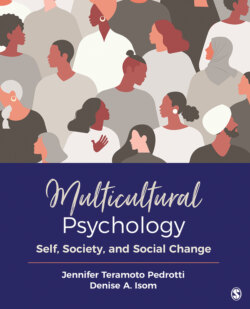Читать книгу Multicultural Psychology - Jennifer T. Pedrotti - Страница 59
На сайте Литреса книга снята с продажи.
Worldview Related to Race and Ethnicity
ОглавлениеI’m in college right now and I go to a private college—my dad went to the same one years ago and I’ve always dreamed of coming here—but there aren’t very many African American students like me here, and almost no professors who aren’t White. Sometimes other students think I’m here on scholarship or that I got in because of my race, but I actually come from a pretty affluent area, and went to a high school that had a lot of AP classes available. I have always been a good student, and so my grade point average is as high or higher than that of a lot of the students here. Whenever I start a class with a new professor, especially if the professor is White, I have a few things that I do so that I get off on the right foot. I’m a big guy, and my skin is very dark. I know sometimes this makes people feel afraid of me before they know me—I see this in their eyes sometimes. So, I always go up on the first day and introduce myself, especially if there is another Black student in the class, so they don’t mix us up. Sometimes I try to get it in the conversation that my dad is an alumnus, so they know I belong here. Then I try to work twice as hard as everyone else, go into office hours whenever I can, and make sure that the professor knows I’m a good student. I’m not sure if it’s annoying to them sometimes, but I want to make sure that they know me for me, instead of via some stereotype about Black people that they may have. It takes a lot of extra time to do all of this, but I feel like I have to if I’m going to be treated fairly. White students still ask me if I’m on an athletic scholarship, or if I’m a first-generation college student, or if I’m from a bad neighborhood, but at least I make sure my professors know my real story. Who knows—this might help me in other ways too. It seems like lately there are so many news stories out there where people call the police because they think an African American person is not supposed to be in a particular place. Having so many professors to be able to verify that I’m a real student and also a good person might help me out if that ever happens to me.
—Alex, age 19
The story above shows that Alex does some things on a regular basis based on his worldview of what he experiences as a “normal” reaction from White people. His worldview impacts his daily activities and the way in which he carries himself, and it also involves some expectations he has for others who may be different from him in some way. Given what we have already discussed about different models of worldview, Alex appears to embody a IC-ER type of worldview as described by Sue (1978). This is clearly illustrated in the high level of control he has over his behaviors in terms of the structure and specificity he provides in this vignette. It is also clear, however, from this description that Alex understands that there are forces here that are out of his control in terms of stereotyping and racism. Alex is attempting to modify others’ initial and implicit impressions of him by behaving in a way that potentially counteracts these types of stereotypes. In addition, he recognizes that even though he makes these efforts, there may still be factors and experiences linked to stereotyping (e.g., someone thinking he doesn’t belong on campus as an African American man) that he cannot control and are thus outside of his responsibility.
